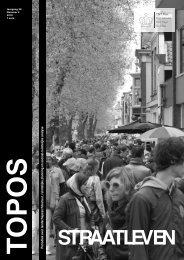Changing public space
Changing public space
Changing public space
You also want an ePaper? Increase the reach of your titles
YUMPU automatically turns print PDFs into web optimized ePapers that Google loves.
Discussions during the focus group meetings with the advisory team suggested that the role of<br />
aldermen of spatial planning in redevelopment projects is influenced by their political affiliation.<br />
Without exception, the aldermen were members of the Dutch labour party (Partij van de Arbeid,<br />
PvdA). Although this finding might be coincidental and should be investigated with respect to<br />
a larger number of redevelopment projects, one private-sector representative confirmed that his<br />
organisation prefers to co-operate with labour aldermen as they make good plans in a fast pace.<br />
The alderman can thus play a significant role in the redevelopment process, but what are<br />
his main objectives? Lenzholzer (2005) states that implementing redevelopment projects is a<br />
good way of obtaining votes within the Dutch local election period of four years. An upgraded<br />
city centre serves as business card and increases the possibility of the responsible politicians to<br />
become re-elected. An informant believed that creating goodwill among the local population is<br />
indeed one of the motives of politicians to redevelop <strong>public</strong> <strong>space</strong>. He based his argumentation<br />
on Rotterdam, where the local government lately focused on creating clean and safe <strong>public</strong> <strong>space</strong><br />
rather than (re)developing showcases like the Schouwburgplein and Beurstraverse in the 1990s:<br />
Chances are high that the attention for showcase projects will grow in the coming election<br />
period. The ‘Fortuyn’ [populist politician who was assassinated in 2002] aldermen want to<br />
leave something behind after four years of merely creating clean and safe <strong>public</strong> <strong>space</strong>.<br />
They already posed the idea: “wouldn’t be nice if my period in office would (instead of a<br />
project) at least lead to a visionary plan for the future?” (Private-sector representative II)<br />
However, most of the interviewed informants countered this idea and stated that the responsible<br />
aldermen were mainly committed to improving the urban structure of the city rather than<br />
creating goodwill for themselves or their party among the local population.<br />
8.2.2 Role and objectives of the private sector<br />
In Section 7.6 the conclusion was drawn that retail is an important, if not compulsory<br />
precondition for the private sector to become involved in the redevelopment of <strong>public</strong> <strong>space</strong>.<br />
The real estate literature emphasises that the main motive for developers and investors to engage<br />
in urban redevelopment is the achievement of high returns on investment (Section 4.4.2).<br />
According to the European Shopping Centre Digest (CB Richard Ellis/IPD, 2006) retail is the<br />
best performing real estate sector in Europe. The preference to participate in the redevelopment<br />
of retail squares can thus be linked to the higher return on investment in comparison to cultural,<br />
café, or residential squares. The private-sector representatives generally confirmed this:<br />
Developers and investors prefer to lease out to retail rather than cafés or restaurants,<br />
because the rent of a shop is generally higher. Plus cafés and restaurants are more<br />
vulnerable, because you are very dependent on the manager. A large part of the shops,<br />
on the other hand, are franchise or chain stores, which makes it easier to appraise. Most<br />
developers active in city centres develop combinations of shops, housing and parking,<br />
maybe some offices too. (Private-sector representative III)<br />
In general, the willingness of the private sector to co-operate in <strong>public</strong> <strong>space</strong> redevelopment<br />
increases when it involves the construction of new commercial buildings:<br />
That’s a very important difference: a square where no large-scale investment in real estate<br />
occurs, where no real property development takes place, will have difficulties generating<br />
money from the market. However, when property development occurs, there’s all of a<br />
sudden a large bag of money. Then there is always some capital available for the design of<br />
<strong>public</strong> <strong>space</strong>. (Private-sector representative II)<br />
165




